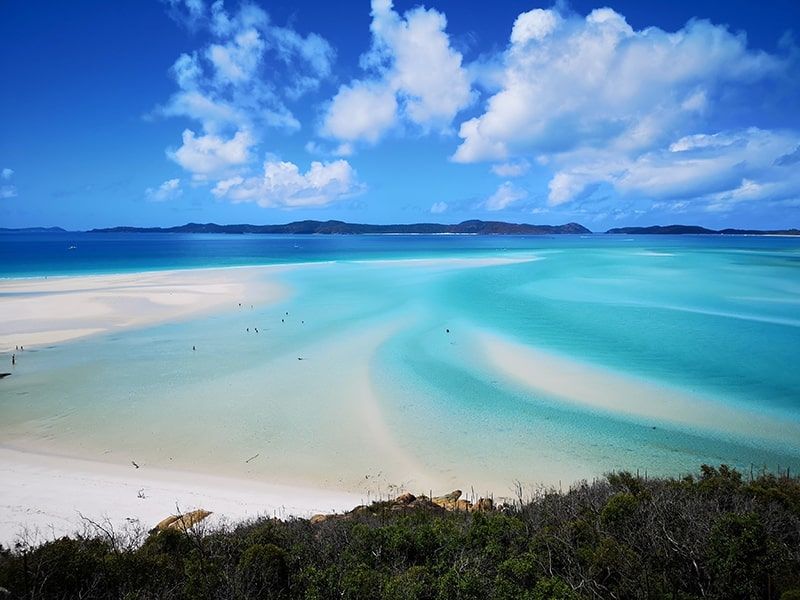/headlines/pictures/4355/original/australie-visa-rock-1611915510.jpg)
Many people associate Australia with kangaroos, koalas, beaches, giant spiders and the vast outback, but it has much more to offer than all of that. This country is the sixth largest in the world, so it's no surprise that there is so much to see and do. Although it is currently impossible to travel due to the coronavirus, there is no harm in continuing to dream of future trips and imagining the countries to visit.
Uluru and Kata Tjuta
Many people know the image of Uluru, even if they don't know the name. Uluru is a giant rock formation located in the center of Australia and it is one of the most popular tourist attractions in the country, as well as one of its most famous natural sites. Many tourists visit Uluru at sunrise or sunset, when the rock appears to change color. The rock formation is located in Uluru-Kata Tjuta National Park, which has been a UNESCO World Heritage Site since 1987. About 25 kilometers from Uluru is another rock formation: Kata Tjuta, also known as Mount Olga.
The Great Barrier Reef and Fraser Island
The Great Barrier Reef is another Australian natural landscape listed as a World Heritage Site, and not without reason: as many people know, it is the largest barrier reef in the world. For lovers of the sea, beach and marine life, it is also advisable to visit the Whitsunday Islands, an archipelago of 74 islands that lie off the coast of Queensland, near the Great Barrier Reef. The Whitsunday Islands are a true paradise with beautiful white sand beaches and azure waters. Also worth mentioning is Fraser Island, located off the east coast of Australia. This island also has something unique, as it is the largest sand island in the world.

The Whitsunday Islands © Marcel Wiemers
The national parks
The land of kangaroos and koalas also has several national parks that are worth visiting. The Nambung National Park, for example, is home to the Pinnacles Desert: a desert landscape with thousands of standing limestone pillars (the "Pinnacles"), some of which are up to five meters high. Another must-see national park is Karijini National Park, where you will find gorges up to a hundred meters deep, created by millions of years of erosion. Kakadu National Park is also worth a visit; the park is huge and thus presents a very varied landscape.
Tasmania
Located 240 kilometers from the Australian mainland, Tasmania is an island with a very diverse vegetation. Many plants grow on this island and are only present on this territory. The island is also the only place where the Tasmanian devil lives. Along the east coast of Tasmania is Maria Island, an island declared a national park for its particularly rich flora and fauna, including many threatened species.
Documents needed to travel to Australia
All travelers planning to visit Australia in due course should ensure that they have all the necessary documents, including the Australia Visa. The Australia Tourist Visa (eVisitor) can be applied for easily and quickly online. Before applying for a visa, it is important to check if you meet all the requirements of the visa. You must have a valid passport, which must be valid for at least six months after your arrival in Australia. With an Australia visa, you can also visit Tasmania, for which no additional or separate visa is required.
Main photo: Uluru © Kyle Hinkson


Cozy apartments, private rooms and amazing homes: be welcomed by the gay community in over 200 countries
Apartments, rooms, homes: be welcomed by the gay community
don't miss
/headlines/pictures/4404/original/cover-image-every-traveler-1705415644.jpg)
/headlines/pictures/4339/original/newyearsdestinationscoveredit-1571329791.jpg)
/headlines/pictures/4391/original/cover-image-solo-travel-1681999350.jpg)
/headlines/pictures/4368/original/gay-beaches-au-cover-edit-1647359866.jpg)
/headlines/pictures/4380/original/sydney-opera-house-daniel-boud-cover-image-1666711984.jpg)
/headlines/pictures/4369/original/thai-restaurant-peter-1655050836.jpg)
/headlines/pictures/4269/original/sydneymardigrashacksrefreshedit-1580293724.jpg)
/headlines/pictures/4192/original/gay-ski-week-australia-rainbow-cover-1535983338.jpg)
/headlines/pictures/3683/original/gay-nude-beach-cover-1642690819.jpg)
/headlines/pictures/4012/original/850x550-aussiebum-1501862489.jpg)
 by
by


















/headlines/pictures/4335/original/almarresortcouplephotocover-1568735215-1654960752.jpg)
/headlines/pictures/4405/original/lgbtq-milestones-cover-1706630659.jpg)
/headlines/pictures/4384/original/european-snow-pride-asset-3-cover-1736431991.jpg)
/headlines/pictures/4251/original/cover-image-nye-edit-1544629088.jpg)